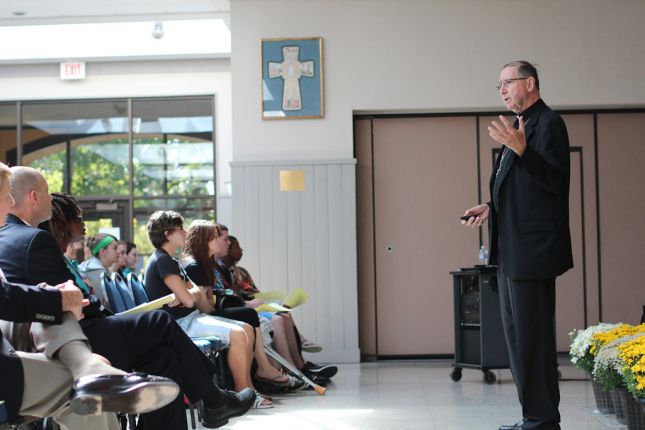
Cardinal Roger M. Mahony, archbishop emeritus of Los Angeles, Calif., encouraged students and faculty to see immigrants not as “others” – but as themselves.
“[When] we come out of the economic downturn, you’re gonna hear far less about immigrants as a threat,” Mahony said. “We send two distinct messages at our borders: ‘No Trespassing’ and ‘Help Wanted.’ Because we want it both ways: ‘yes, please come and do all these low-skill, low-income jobs, but please don’t come.’ We’re used to having it both ways.”
His presentation on Friday, Sept. 14 provided both biblical and historical contexts for people “on the move,” from Moses guiding captive Jews out of Egypt in the Old Testament, to, according to Mahony, the first migrants in recorded history: Adam and Eve.
“Adam and Eve got tossed out of the garden, you remember, because of their sin, their misconduct,” Mahony said. “And they became the first ones to be on the move.”
President Reagan was the last president to introduce a piece of immigration legislation: in 1986, he signed the Immigration Reform and Control Act into law.
Now, 26 years later, Obama’s immigration policy will permit undocumented immigrants under age 30 to stay and work in the U.S. provided they have a high school diploma or GED, or are otherwise enlisted in the military. Obama’s provision for these undocumented immigrants, however, will only buy them five years.
“Every time in our history [that] we have a downturn in the economy, or a recession, or a depression, immigrants become the brunt of the blame,” Mahony said. “We always do this.”
Mahony cited Leviticus 19:33-34 for how immigrants should be treated: “When an alien lives with you in your land, do not mistreat him. The alien living with you must be treated as one of your native-born. Love him as yourself, for you were aliens in Egypt.”
Even “native-born” Philadelphians come from families that once were aliens.
“Philadelphia was the primary port of entry for all of the immigrants in the early decades of our history,” Mahony said. He described the 1780s as a time when the first settlers in the colonies were so desperate for workers that they sent agents back to Europe to attract the manpower necessary for building railroads and working the land; eventually, he said, the improvement of ship conditions led to the influx of immigrants that led to our country’s prosperity. Mahony explained that immigrants started taking low-paying jobs after WWII – and the pattern continues today.
“During this period, we also [had] the ‘Know Nothings,’ and the first anti-immigrant sentiment,” Mahony said. “The Know Nothings – they feared competition from foreigners, they didn’t like religion, politics, etcetera – demanded laws to slow down and stop the flow of immigrants.”
Mahony explained that the Know Nothings had a stronghold in Philadelphia, and it was because of them that Villanova University was built so far from the city: they frequently burned down churches and entire parishes in protest. The Augustinians who founded Villanova didn’t want to put their students’ lives at risk.
Fast-forwarding to today, Mahony tackled the topic of our modern yet unchanged anti-immigrant rhetoric, asking simply, “What went wrong?”
According to Mahony, nothing did go wrong.
One of the things we need to do today to move forward is to move away from our focus on the system of immigration,” Mahony said, “and focus upon immigrants themselves. We must ask ourselves, ‘Who are these people in our midst? And how do we help them move forward?’”


